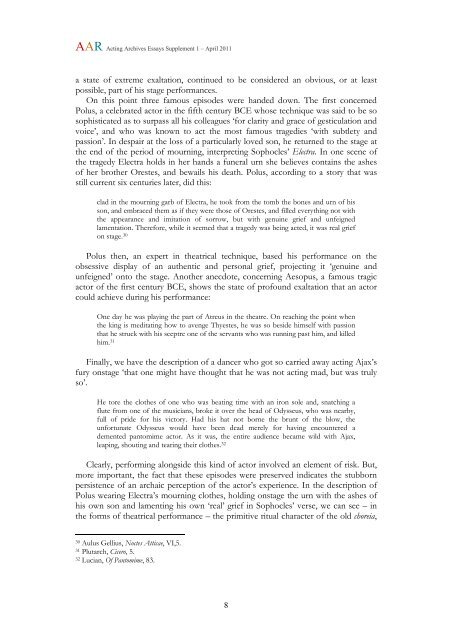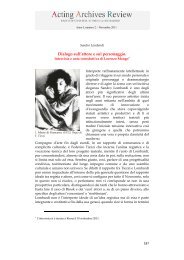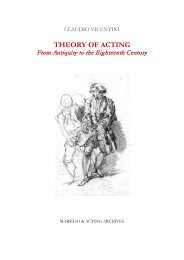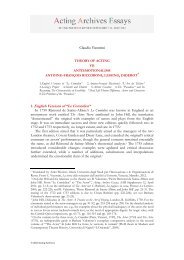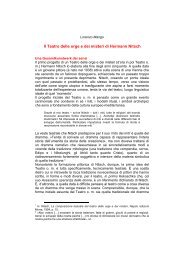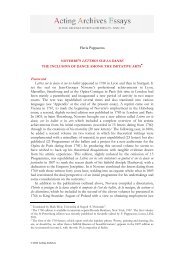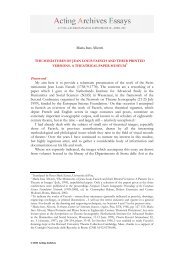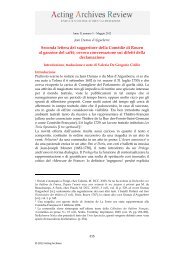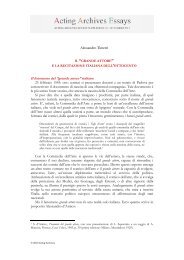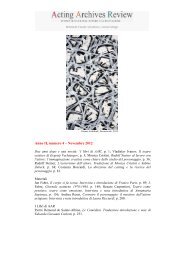AAR <strong>Act<strong>in</strong>g</strong> <strong>Archives</strong> Essays Supplement 1 – April 2011a state of extreme exaltation, cont<strong>in</strong>ued to be considered an obvious, or at leastpossible, part of his stage performances.On this po<strong>in</strong>t three famous episodes were handed down. The first concernedPolus, a celebrated actor <strong>in</strong> <strong>the</strong> fifth century BCE whose technique was said to be sosophisticated as to surpass all his colleagues ‘for clarity and grace of gesticulation andvoice’, and who was known to act <strong>the</strong> most famous tragedies ‘with subtlety andpassion’. In despair at <strong>the</strong> loss of a particularly loved son, he returned to <strong>the</strong> stage at<strong>the</strong> end of <strong>the</strong> period of mourn<strong>in</strong>g, <strong>in</strong>terpret<strong>in</strong>g Sophocles’ Electra. In one scene of<strong>the</strong> tragedy Electra holds <strong>in</strong> her hands a funeral urn she believes conta<strong>in</strong>s <strong>the</strong> ashesof her bro<strong>the</strong>r Orestes, and bewails his death. Polus, accord<strong>in</strong>g to a story that wasstill current six centuries later, did this:clad <strong>in</strong> <strong>the</strong> mourn<strong>in</strong>g garb of Electra, he took from <strong>the</strong> tomb <strong>the</strong> bones and urn of hisson, and embraced <strong>the</strong>m as if <strong>the</strong>y were those of Orestes, and filled everyth<strong>in</strong>g not with<strong>the</strong> appearance and imitation of sorrow, but with genu<strong>in</strong>e grief and unfeignedlamentation. Therefore, while it seemed that a tragedy was be<strong>in</strong>g acted, it was real griefon stage. 30Polus <strong>the</strong>n, an expert <strong>in</strong> <strong>the</strong>atrical technique, based his performance on <strong>the</strong>obsessive display of an au<strong>the</strong>ntic and personal grief, project<strong>in</strong>g it ‘genu<strong>in</strong>e andunfeigned’ onto <strong>the</strong> stage. Ano<strong>the</strong>r anecdote, concern<strong>in</strong>g Aesopus, a famous tragicactor of <strong>the</strong> first century BCE, shows <strong>the</strong> state of profound exaltation that an actorcould achieve dur<strong>in</strong>g his performance:One day he was play<strong>in</strong>g <strong>the</strong> part of Atreus <strong>in</strong> <strong>the</strong> <strong>the</strong>atre. On reach<strong>in</strong>g <strong>the</strong> po<strong>in</strong>t when<strong>the</strong> k<strong>in</strong>g is meditat<strong>in</strong>g how to avenge Thyestes, he was so beside himself with passionthat he struck with his sceptre one of <strong>the</strong> servants who was runn<strong>in</strong>g past him, and killedhim. 31F<strong>in</strong>ally, we have <strong>the</strong> description of a dancer who got so carried away act<strong>in</strong>g Ajax’sfury onstage ‘that one might have thought that he was not act<strong>in</strong>g mad, but was trulyso’.He tore <strong>the</strong> clo<strong>the</strong>s of one who was beat<strong>in</strong>g time with an iron sole and, snatch<strong>in</strong>g aflute from one of <strong>the</strong> musicians, broke it over <strong>the</strong> head of Odysseus, who was nearby,full of pride for his victory. Had his hat not borne <strong>the</strong> brunt of <strong>the</strong> blow, <strong>the</strong>unfortunate Odysseus would have been dead merely for hav<strong>in</strong>g encountered ademented pantomime actor. As it was, <strong>the</strong> entire audience became wild with Ajax,leap<strong>in</strong>g, shout<strong>in</strong>g and tear<strong>in</strong>g <strong>the</strong>ir clo<strong>the</strong>s. 32Clearly, perform<strong>in</strong>g alongside this k<strong>in</strong>d of actor <strong>in</strong>volved an element of risk. But,more important, <strong>the</strong> fact that <strong>the</strong>se episodes were preserved <strong>in</strong>dicates <strong>the</strong> stubbornpersistence of an archaic perception of <strong>the</strong> actor’s experience. In <strong>the</strong> description ofPolus wear<strong>in</strong>g Electra’s mourn<strong>in</strong>g clo<strong>the</strong>s, hold<strong>in</strong>g onstage <strong>the</strong> urn with <strong>the</strong> ashes ofhis own son and lament<strong>in</strong>g his own ‘real’ grief <strong>in</strong> Sophocles’ verse, we can see – <strong>in</strong><strong>the</strong> forms of <strong>the</strong>atrical performance – <strong>the</strong> primitive ritual character of <strong>the</strong> old choreia,30 Aulus Gellius, Noctes Atticae, VI,5.31 Plutarch, Cicero, 5.32 Lucian, Of Pantomime, 83.8
<strong>Claudio</strong> <strong>Vicent<strong>in</strong>i</strong>, <strong>Act<strong>in</strong>g</strong> <strong>Theory</strong> <strong>in</strong> <strong>the</strong> <strong>Ancient</strong> <strong>World</strong><strong>in</strong> which <strong>the</strong> participants displayed au<strong>the</strong>ntic passions and feel<strong>in</strong>gs, channell<strong>in</strong>g <strong>the</strong>m<strong>in</strong> <strong>the</strong> manner of a religious ceremony. The stories of Aesopus slay<strong>in</strong>g <strong>the</strong> servantand <strong>the</strong> dancer maddened by Ajax’s fury show a return of <strong>the</strong> old idea of act<strong>in</strong>g asclose to a state of uncontrollable mental alteration. We can also see aga<strong>in</strong> <strong>the</strong> idea ofa contagion that possesses <strong>the</strong> audience, excited by <strong>the</strong> performer’s alteration,unleash<strong>in</strong>g among <strong>the</strong>m a correspond<strong>in</strong>g madness.Of course it is impossible to know if <strong>the</strong>se episodes were true or not; but <strong>the</strong>mere fact that <strong>the</strong>y were preserved and handed down <strong>in</strong>dicates a cont<strong>in</strong>uity <strong>in</strong> <strong>the</strong>culture of <strong>the</strong> ancient world of <strong>the</strong> archaic way of conceiv<strong>in</strong>g act<strong>in</strong>g, associat<strong>in</strong>g itwith a state of profound frenzy.4. Moderation and Self-Control. The Emergence of <strong>the</strong> CharacterThe traditional conception of act<strong>in</strong>g, however, was bound to clash with an idealthat was gradually impos<strong>in</strong>g itself <strong>in</strong> Greek culture between <strong>the</strong> fifth and fourthcenturies BCE, and that received much attention, first <strong>in</strong> <strong>the</strong> teach<strong>in</strong>g of Socrates,and <strong>the</strong>n of Plato and Aristotle. This was a moral ideal, which posited <strong>the</strong> ability tocontrol our impulses and desires through <strong>the</strong> exercise of our rational faculties as avalue. In <strong>the</strong> field of aes<strong>the</strong>tics this ideal extended to <strong>the</strong> recognition of <strong>the</strong>importance of self-control and moderation, which became essential requisites <strong>in</strong> anywork of art: ‘moderation’, claimed Democritus, is everywhere beautiful, ‘what isexcessive’ can never seem beautiful. 33As far as act<strong>in</strong>g was concerned, it meant reject<strong>in</strong>g any uncontrolled emotionalexpression, reflected <strong>in</strong> disorderly and excessive gestures. In <strong>the</strong> Laws Platocondemned <strong>the</strong> members of <strong>the</strong> chorus who went <strong>in</strong>to a frenzy, ‘vent<strong>in</strong>g all k<strong>in</strong>ds ofblasphemy on sacred th<strong>in</strong>gs’ and who tried to stir <strong>the</strong> souls of <strong>the</strong> audience and to‘make <strong>the</strong>m weep at once’ with ‘words, rhythms and dismal harmonies’. 34 In hisPoetics Aristotle criticized actors who ‘<strong>in</strong>dulge <strong>in</strong> restless movements onstage’,precisely like ‘those lamentable flautists who twist and twirl’. Aga<strong>in</strong> <strong>in</strong> <strong>the</strong> Poetics helater recalled how <strong>the</strong> actor Callippides was called an ‘ape’ because his gestures ‘wereso extravagant’. 35 Several centuries later, Lucian was to conclude his story of <strong>the</strong>dancer seized by a frenzy while <strong>in</strong>terpret<strong>in</strong>g Ajax’s fury, observ<strong>in</strong>g that when <strong>the</strong>artist came to his senses at <strong>the</strong> end of <strong>the</strong> performance, he was sick with remorse andshame, and long regretted his excesses, particularly as one of his rivals had laterperformed <strong>the</strong> same subject without mak<strong>in</strong>g <strong>the</strong> same error and had won generalapproval. 36The development of act<strong>in</strong>g techniques and <strong>the</strong> ideal of moderation as an<strong>in</strong>dispensable requisite for all artistic expression thus required actors onstage to keep<strong>the</strong>ir irrational impulses under rigorous control. Not that this meant elim<strong>in</strong>at<strong>in</strong>g anyemotional tension. Indeed, it rema<strong>in</strong>ed an <strong>in</strong>dispensable qualification. But <strong>in</strong> <strong>the</strong> newcultural climate <strong>the</strong> tempest of feel<strong>in</strong>gs that was orig<strong>in</strong>ally supposed to take <strong>the</strong>mover and madden <strong>the</strong>m tended to be conceived <strong>in</strong> profoundly different terms, and33 Diels, Democritus, fragment B 102.34 Plato, Laws, VII,800d.35 Aristotle, Poetics, 1461b-1462a.36 See Lucian, Of Pantomime, 84.9
- Page 1 and 2: Claudio VicentiniTHEORY OF ACTINGIA
- Page 3 and 4: Claudio Vicentini, Acting Theory in
- Page 5 and 6: Claudio Vicentini, Acting Theory in
- Page 7: Claudio Vicentini, Acting Theory in
- Page 11 and 12: Claudio Vicentini, Acting Theory in
- Page 13 and 14: Claudio Vicentini, Acting Theory in
- Page 15 and 16: Claudio Vicentini, Acting Theory in
- Page 17 and 18: Claudio Vicentini, Acting Theory in
- Page 19 and 20: Claudio Vicentini, Acting Theory in
- Page 21 and 22: Claudio Vicentini, Acting Theory in
- Page 23 and 24: Claudio Vicentini, Acting Theory in
- Page 25: Claudio Vicentini, Acting Theory in


